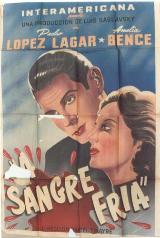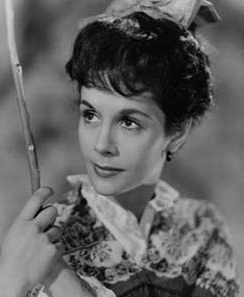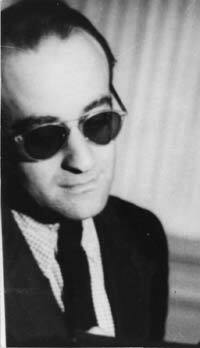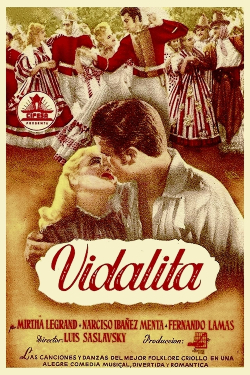Related Research Articles

Marcelo Piñeyro is an Argentine award-winning film director, screenwriter, and film producer.

A sangre fría is a 1947 Argentine murder thriller film directed by Daniel Tinayre and written by Luis Saslavsky.
The Premio Adonáis, or Adonais Prize for Poetry, is awarded annually in Spain by Ediciones RIALP to an unpublished Spanish language poem. Runners-up are also recognized.

Delia Amadora García Gerboles better known as Delia Garcés was an Argentine film actress of the Golden Age of Argentine cinema, making almost 30 appearances in film between 1937 and 1959. She also acted on stage from 1936 to 1966. She won the Premios Sur Best Actress award three times from the Argentine Academy of Cinematography Arts and Sciences, as well as the Argentine Film Critics Association's Silver Condor Award for Best Actress, the Premios Leopold Torre Nilsson, Premio Pablo Podestá, and the inaugural ACE Platinum Lifetime Achievement Award from the Asociación de Cronistas del Espectáculo.

Laura Ana "Tita" Merello was an Argentine film actress, tango dancer and singer of the Golden Age of Argentine cinema. In her six decades in Argentine entertainment, at the time of her death, she had filmed over thirty movies, premiered twenty plays, had nine television appearances, completed three radio series and had had countless appearances in print media. She was one of the singers who emerged in the 1920s along with Azucena Maizani, Libertad Lamarque, Ada Falcón, and Rosita Quiroga, who created the female voices of tango. She was primarily remembered for the songs "Se dice de mí" and "La milonga y yo".

Luis Saslavsky was an Argentine film director, screenwriter and film producer, notable for his work during the classical era of Argentine cinema.

The Phantom Lady is a 1945 Argentine film directed by Luis Saslavsky during the classical era of Argentina cinema. At the 1946 Argentine Film Critics Association Awards the film won Silver Condor Awards for Best Film, Best Director, Best Adapted Screenplay and Best Music. It is based on a seventeenth-century comedy with the same name by Pedro Calderón de la Barca, translated as The Phantom Lady. However, the film alters the play considerably - the plot is heavily rewritten, and the style of dialogue is completely changed. Calderon's comedy is written in verse, while the screenplay of the film is in prose and contains scenes not found in the play. The final scene includes a fierce storm from which the hero rescues the heroine and declares his love for her, a scene added to the film.

Story of a Bad Woman is a 1948 Argentine drama film directed by Luis Saslavsky and starring the Mexican and Hollywood superstar Dolores del Río, María Duval, Alberto Closas. It is based on the 1892 Oscar Wilde play Lady Windermere's Fan. The film's art direction was by Raúl Soldi. It was made by Argentina Sono Film, one of the country's biggest studios during the era.

Vidalita is a 1949 Argentine comedy film directed and co-written by Luis Saslavsky and produced by Emelco during the classical era of Argentina cinema. It stars Mirtha Legrand as the title character, a girl who cross-dresses as a gaucho to be able to take charge of her grandfather's estate. This was considered transgressive for the time.i Fernando Lamas stars as the captain of the fort, who falls in love with Legrand's character "to the point that he is willing to marry her without knowing if she is a man or a woman".
El Fausto criollo is a 1979 Argentine fantasy drama film directed by Luis Saslavsky and Miguel Angel Lumaldo. It was written by Saslavsky with the collaboration of Estela Canto, Luisa Mercedes Levinson and Enrique Anderson Imbert, and based on the novel El Fausto Criollo, by Estanislao del Campo. It stars Claudio García Satur, María Valenzuela, Pedro Quartucci, Luisa Vehil and Gerardo Romano. Oscar Aráiz was in charge of the film's choreography. It was filmed in Eastmancolor and released on October 25, 1979.
Lucio Godoy is a Spanish-Argentine film composer and music producer.

Alita Blanca Barchigia, better known as Alita Román, was an Argentine film actress of the Golden Age of Argentine cinema.
Hernando Téllez was a Colombian journalist and writer. Born and educated in Bogotá, Téllez entered very early the world of journalism, with which he is primarily identified, having been on the staff of some of Colombia's most popular newspapers and magazines. It was not until 1950 with the publication of his short story collection Cenizas para el viento, that his name became more widely known. His tragicomic tales evidence his keen and extremely sensitive observations of contemporary life and, more particularly, the anguishing reality of his native country.

The 2011–2012 Puyehue-Cordón Caulle eruption was a volcanic eruption that began in the Puyehue-Cordón Caulle volcanic complex in Chile on 4 June 2011. The eruption, which occurred from the Cordón Caulle fissure after 51 years of the volcano being inactive, is one of the largest volcanic eruptions of the 21st century thus far. At least 3,500 people were evacuated from nearby areas, while the ash cloud was blown across cities all around the Southern hemisphere, including Bariloche, Buenos Aires, Montevideo, Stanley, Porto Alegre, Cape Town, Hobart, Perth, Adelaide, Sydney, Melbourne, Wellington, Auckland and Port Moresby, forcing airlines to cancel hundreds of international and domestic flights and causing travel chaos.
Oscar Valicelli was an Argentine film actor.

Luis Alberto Ambroggio is an Argentine American poet, independent scholar and writer. Full Member of the North American Academy of the Spanish Language and correspondent of the Spanish Royal Academy. His works include essays, poetry and translations.

Passport to Rio is a 1948 Argentine crime film, directed by Daniel Tinayre and written by César Tiempo and Luis Saslavsky. It premiered on September 29, 1948.

Eliécer Cárdenas Espinosa was an Ecuadorian novelist.
Olinda Bozán was an Argentine film actress and comedian of the Golden Age of Argentine cinema. Born into a circus family, she acted on the vaudeville circuit, and performed in silent and sound movies. She was trained by the Podestá brothers, one of whom she married, who have one of the most prestigious Argentine acting awards named for them. Bozán appeared in 75 films and was considered one of the best comic actors of Argentine cinema in the 20th century.
"Cardo o ceniza" is a song written and performed by Chabuca Granda. It was written in 1973 and tells of the passionate desire and shame felt by Chilean singer-songwriter Violeta Parra after being rejected by her lover, Gilbert Favre.
References
- 1 2 "Ceniza al viento". Studies in Latin American Popular Culture. 21. University of Arizona: 93, 101. 2002. Retrieved 11 June 2015.
- 1 2 3 Finn, Oscar Barney (1994). Luis Saslavsky (in Spanish). Buenos Aires: Centro Editor de América Latina con el auspicio del Instituto Nacional de Cinematografía. p. 55. ISBN 950-25-3174-4.